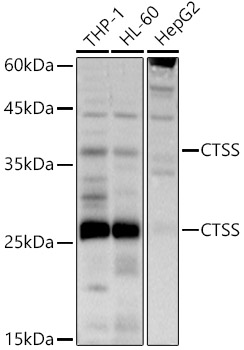Anti-Cathepsin S [Fsn0503 (1E4)]
AB02999-10.0-BT
ApplicationsImmunoFluorescence, Western Blot, ELISA, ImmunoCytoChemistry, ImmunoHistoChemistry, Neutralisation/Blocking, Other Application
Product group Antibodies
ReactivityHuman
TargetCTSS
Overview
- SupplierAbsolute Antibody
- Product NameAnti-Cathepsin S [Fsn0503 (1E4)]
- Delivery Days Customer9
- Application Supplier NoteThis antibody significantly blocked invasion of a range of tumor cell lines, most significantly HCT116 colorectal carcinoma cells, through inhibition of extracellular cathepsin S-mediated proteolysis. This antibody also shows anti-angiogenic effects as it blocked endothelial cell capillary tube formation and aortic microvascular sprouting. In vivo administration of this antibody resulted in inhibition of tumor growth and neovascularization of HCT116 xenograft tumors. The binding specificity of this antibody towards cathepsin S was determined by ELISA and western blot. This antibody was also used to study the expression of cathepsin S in HCT116 cells using immunocytochemistry (PMID: 19789302). This antibody also demonstrates anti-angiogenic effects and significantly reduces microtubule formation by HUVEC cells in vitro and vessel outgrowth in the (ex vivo) rat aortic ring model (Gormley et al., AACR 101st Annual Meeting 2010, Apr 17-21). It was also reported that this antibody attenuated HCT116 tumor cell invasion by 64% (p: <0.0001), preventing CatS-mediated extracellular matrix hydrolysis and led to a reduction in tumor mass and metastatic burden in preclinical models (Olwill, AACR Annual Meeting 2009, Apr 18-22). It was shown that this antibody promotes pericellular hydrolysis of extracellular matrix components in the tumor microenvironment and facilitates endothelial invasion. It blocks extracellular proteolysis, inhibiting endothelial invasion and tube formation in cell-based assays. Antibody-mediated targeting of cathepsin S represents a novel method of inhibiting angiogenesis. A combination of this antibody with anti-VEGF therapies has the potential to significantly enhance current treatments of tumor neovascularization (PMID: 20824056). The binding of humanized version of this antibody to surface associated cathepsin S resulted in natural killer (NK) cell targeted tumor killing. Cathepsin S is reported to be a potential surface therapeutic target for eliciting ADCC in tumor cell (PMID: 22168338). The humanized version of this antibody is available on request. This antibody was used for the immunohistochemical analysis of tumor progression and tumor vascularization. It was also shown that combination of Cathepsin S inhibition with CPT-11 enhances the therapeutic effect of the chemotherapy. (PMID: 21896304).
- ApplicationsImmunoFluorescence, Western Blot, ELISA, ImmunoCytoChemistry, ImmunoHistoChemistry, Neutralisation/Blocking, Other Application
- CertificationResearch Use Only
- ClonalityMonoclonal
- Clone IDFsn0503 (1E4)
- Gene ID1520
- Target nameCTSS
- Target descriptioncathepsin S
- Target synonymscathepsin S
- HostHuman
- IsotypeIgG1
- Protein IDP25774
- Protein NameCathepsin S
- Scientific DescriptionThis chimeric human antibody was made using the variable domain sequences of the original Mouse IgG1 format for improved compatibility with existing reagents assays and techniques.
- ReactivityHuman
- Storage Instruction-20°C,2°C to 8°C
- UNSPSC12352203





